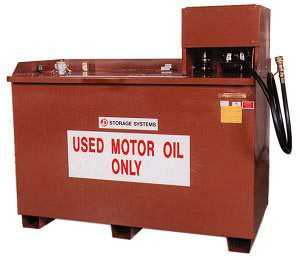Any auto shop has the need for oil collection methods along with storage containers. There are a wide variety of waste oil collection tanks and drains, and waste oil storage containers.
Most importantly, your shop must conform to EPA standards for waste oil storage and collection or you can face penalties. For instance, you must have a plan of procedures in place in the event a spill occurs. If you cannot stop the leak at it’s origin, you must contain the spill by placing the leaking container in another larger container, or by spreading absorbent media over the spill. Once the leak is under control, and has been cleaned up, you must dispose of the waste material properly.
If you contract someone else to clean up and / or dispose of your waste oil, you must be certain that they are disposing of it properly.
Many hydrocarbon based oils can be mixed together. These include waste motor oil, power steering fluid, transmission fluid and hydraulic oil.
First, you must collect the waste oil from the vehicle being serviced. There are many different types of oil drains for this purpose. A basic oil drain consists of a reservoir on caster wheels, with a long neck, and a funnel on top. This type would be used to collect waste oil by way of gravity when the automobile being serviced is up on a Car Lift. Some more intricate models will have air evacuation, which allows you to transfer the oil from the oil drain into your waste oil storage tanks. There are even oil drains with dipstick probes that allow you to run the probe down the dipstick tube, so that you don’t even need to pull the drain plug.

There are also low profile oil drains for when the vehicle is up on jack stands.

Waste oil storage tanks, meant for longer term storage must meet certain criteria. First, they must be properly labeled. Then, they must have double wall construction. Other features that are a good idea would be automatic air shut off to prevent overfilling.
Smart automotive shop owners do not take shortcuts when it comes to this kind of equipment. They know that one spill could cost their shop much more than if they just took the necessary precautions beforehand.

